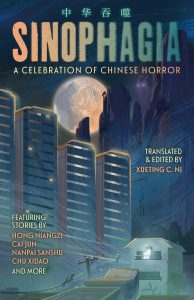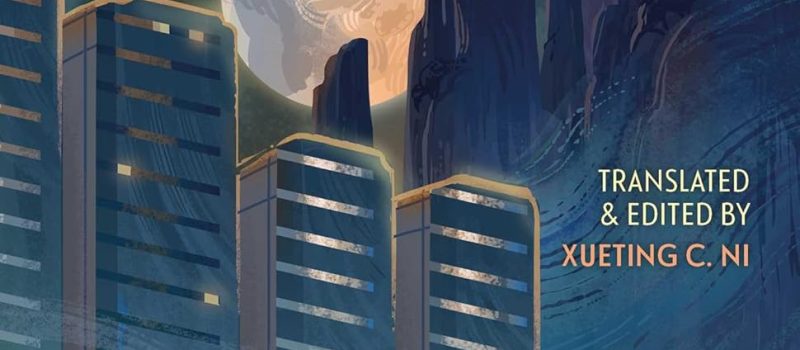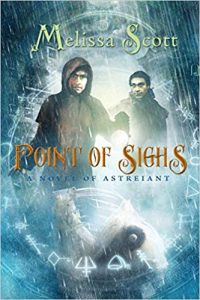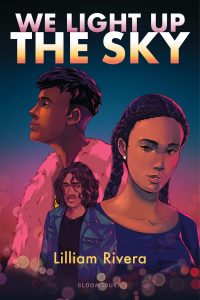Sinophagia edited by Xueting C. Ni: Review by Eugen M. Bacon
 Sinophagia, Xueting C. Ni, ed. (Solaris 978-1-83786-117-0, $16.99, 496pp, tp) September 2024.
Sinophagia, Xueting C. Ni, ed. (Solaris 978-1-83786-117-0, $16.99, 496pp, tp) September 2024.
Sinophagia: A Celebration of Chinese Horror is a carefully curated anthology of contemporary Chinese horror. It’s a cultural fest that arrives with triggers warnings of corpses, childhood trauma, self-harm, torture, graphic violence, domestic violence, strangulation and, strangely, coercion/gaslighting – not commonly associated with horror, but typical of psychological abuse.
Translated and edited by Xueting C. Ni, Sinophagia: A Celebration of Chinese Horror, is a companion to Sinopticon 2021: A Celebration of Chinese Science Fiction (2021). This new anthology opens with the editor’s insightful introduction and each of the 14 stories has an accompanying note at the end to contextualise it for the reader. Ni speaks to the cultural challenges of affiliating with horror and compiling such an anthology:
My own research had shown me that China’s horror fiction was at the same stage science fiction had been around a decade ago, and would also be ready to find an international readership, but whilst there was an amazing love for horror literature here in the West, it seemed that people did not want to be known as horror writers within China. I had paved my way into China’s publishing industry with my first collection, but even with these contacts and avenues, how could I find those excellent writers I had read and written about, if they did not want to be found?
She assumes a broad approach to the subject of horror, focusing on the psychological and paying attention to “phagia – devouring terror, sub-genres of lingyi (paranormal), xuanyi (suspense) and the gothic. She also spotlights violence against women and, in her selection of hand-picked stories, gives voice to marginalised nonhumans and nonmortals, and engaging with difference:
One thing that I have really enjoyed about putting this collection together, has been the way Horror plays with perspective and voice, and there is certainly a vast array in this book, from conventional omniscient narrators and intimate first-person storytelling, to an unusual second person viewpoint, and the marginalised voices of the non-human and non-mortal. There are neuro-divergent characters, and those who are being deliberately misled or manipulated, and sometimes, a combination of these, suddenly, rapidly switching, which make the stories all the more interesting.
The anthology opens with Hong Niangzi’s “The Girl in the Rain” – a starless sky, a scatter of lights from a silver moon into the silent night and a residence shaped like a coffin in this multi-chaptered story with a suicide prelude and the gossipy legend of superstition behind using a red umbrella in the rain.
Fan Zhou’s “The Waking Dream” explores the blurring of reality and illusions and mental aberration arising from the extremes of workplace pressures where no one is safe, even if they work virtually. Chu Xidao’s “Immortal Beauty” is a highlight of the anthology – a first-person tale capturing societal pressures for a wed woman to procreate and the shame associated with barrenness. The author’s preoccupation with blood, death and haunting unravels in the fate of a wronged woman in an ill-fated triangle.
Chuan Ge’s “The Yin Yang Pot” is another highlight with its spectres and how one can find themselves “locked” in marriage to the dead through the very act of dining – which food is consumed and how – leading to an unplanned ghost wedding inside a hotpot restaurant ensconced in a dimly lit street. Our protagonist discovers a dish that breaks the boundaries between the living and dead in a story full of food culture and twists.
There are many good reads, including “The Shanxiao” by Goodnight, Xiaoqing. In this odd story, it’s the damsel who saves the young man in distress, but all is not as it seems in this metafictional story with its readerly address: “What? You’re laughing at this tired old plot… yes, a lot of books tell this sort of story.” It disentangles embedded stories in reimagined tales.
Another enjoyable albeit haunting story is Zhou Dedong’s “Have You Heard of Ancient Glory”, which is a social horror about a haunted suburb. In varied perspectives, the narrative cleverly explores the shifting burial practices in a crowded landscape.
Most stories continue thus, in this clever approach to subversive activism, illuminating the plights of infants, children and young women – as in Nanpai Sanshu’s novella “Records of Xiangxi”, which adopts a different take in chapter-like vignettes unfolding the belief of changelings where some infants are more than they seem. This action-packed story enveloped in mystery indulges readers enchanted with corpses, burial grounds, rituals and superstition in a folkloric retelling of switched babies.
She Cong Ge’s “Those Who Walk at Night, Walk with Ghosts” offers stories-within-a-story in a novelette-length tale that captures folklore and haunting across night walks in remote villages. Yimei Tangguo’s “The Ghost Wedding” spotlights the tragic custom of stolen brides and draws attention to sexual abuse, imprisonment and poverty, while Su Min’s “Ti’Naang” is a Frankenstein-type story with a twist.
Cai Jun’s “Huangcun” is another novella that unfolds a pleasant yet ominous tale. It’s immersive in first-person voice, where an encounter with a strange girl on a cold, Shanghai night leads to a visit to her hometown in an ancient house haunted with familial spectres associated with a ghostly flute.
The anthology is a pleasure and a torment – a pleasure for its cultural stories splashed with familiar tropes and devices of lone gothic settings, moonlit woods, dark alleys, ominous reflections in the water, unseen creatures impersonating voices of loved ones, malevolent shadows… It is a torment for any reader with a penchant for shorter stories.
Translator and editor Xueting C. Ni delivers big heartedly. Sinophagia unquestionably celebrates Chinese horror, and will appeal to readers of gothic horror and those with curiosity for Eastern lore, traditions, and superstition around the paranormal.
Interested in this title? Your purchase through the links below brings us a small amount of affiliate income and helps us keep doing all the reviews you love to read!
Eugen M. Bacon, MA, MSc, PhD, is African Australian, a computer graduate mentally re-engineered into creative writing. She studied at Maritime Campus, less than two minutes’ walk from The Royal Observatory of the Greenwich Meridian. She’s a 2022 World Fantasy Award finalist, and was announced in the honor list of the 2022 Otherwise Fellowships for ‘doing exciting work in gender and speculative fiction’. Her book Danged Black Thing made the 2021 Otherwise Honor List as ‘a sharp collection of Afro-Surrealist work’. Eugen has won or been commended in international awards, including the Foreword Indies Awards, BSFA Awards, Bridport Prize, Copyright Agency Prize, Horror Writers Association Diversity Grant, Otherwise, Rhysling, Elgin, Aurealis, Australian Shadows, Ditmar and Nommo Awards for Speculative Fiction by Africans. Eugen’s creative work has appeared in literary and speculative fiction publications worldwide, including Award Winning Australian Writing, Fantasy Magazine, Fantasy & Science Fiction, and Year’s Best African Speculative Fiction. New releases: Mage of Fools (novel), Chasing Whispers (collection), An Earnest Blackness (essay collection).
This review and more like it in the August 2024 issue of Locus.
 While you are here, please take a moment to support Locus with a one-time or recurring donation. We rely on reader donations to keep the magazine and site going, and would like to keep the site paywall free, but WE NEED YOUR FINANCIAL SUPPORT to continue quality coverage of the science fiction and fantasy field.
While you are here, please take a moment to support Locus with a one-time or recurring donation. We rely on reader donations to keep the magazine and site going, and would like to keep the site paywall free, but WE NEED YOUR FINANCIAL SUPPORT to continue quality coverage of the science fiction and fantasy field.
©Locus Magazine. Copyrighted material may not be republished without permission of LSFF.










